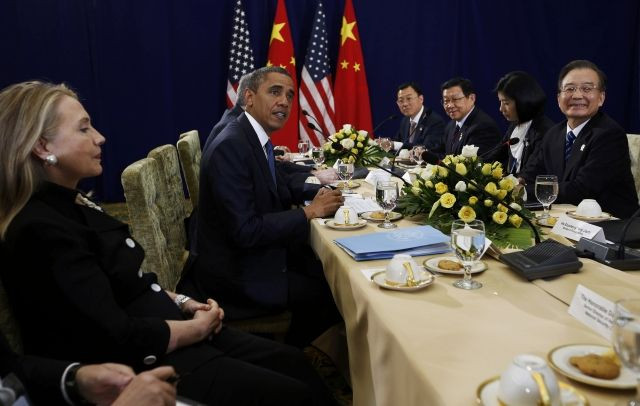In Cambodia, Obama Focuses On Trade With China But Asian Leaders Keen On US Involvement In Maritime Disputes

U.S. President Barack Obama, in his first meeting with China’s outgoing Premier Wen Jiabao since the presidential election, overlooked the maritime disputes between the Southeast and East Asian nations and instead laid the emphasis on establishing clear rules for trade and investment between the U.S. and China.
The two leaders met Tuesday in Cambodia, on the third leg in Obama's Asian tour, at the East Asia Summit, a forum that includes countries beyond the boundaries of the Association of Southeast Asian Nations (ASEAN).
Wen congratulated Obama on his re-election and conveyed greetings from China's new leader Xi Jinping.
"It is very important that as two of the largest economies in the world that we work to establish clear rules of the road internationally for trade and investment," Obama told Jiabao.
"I'm committed to working with China and I'm committed to working with Asia," Obama said. China and the U.S. had a "special responsibility" to lead the way on sustained global growth, he added before the meeting was closed to the media, Reuters reported.
Wen highlighted the differences and disagreements between the two nations but pledged to cooperate in financial and economic matters "to tackle the difficulties” both parties have.
Trade and currency disputes with China had been a much-debated topic between Obama and his Republican presidential rival Mitt Romney during the election campaign.
The public bickering of the ASEAN members over the handling of territorial disputes with China and what role Washington should play in resolving it had overshadowed the talks ahead of their meeting with the top U.S. and Chinese leaders, meant to strengthen trade and political alliances.
Cambodia said Sunday that the 10-member regional bloc “decided that they would not internationalize the South China Sea from now on, that they will focus this entirely within the current existing Asean-China mechanisms.”
“They do not want to complicate the matter,” Kao Kim Hourn, a Cambodian foreign ministry official, was quoted as saying by news agencies.
Cambodia's statement provoked an angry rebuke by the Philippines, which said there was no consensus between the ASEAN leaders.
President Benigno Aquino of the Philippines, a U.S. ally, said Manila wanted the U.S. to get involved in discussions, according to the Philippines Daily Inquirer.
"Our region is very diverse and its harmony can easily be disrupted by sheer political, military, or economic might. Imbalance, as we know, may lead to instability," he said.
"While we are all aware that the U.S. does not take sides in disputes, they do have a strategic stake in the freedom of navigation, unimpeded commerce, and the maintenance of peace and stability in the South China Sea."
China's growing maritime influence in the region has the neighboring nations, including Brunei, Malaysia, Vietnam and Taiwan, worried over territorial confrontations. China claims almost the entire South China Sea, including what is recognized by the U.N. as the Exclusive Economic Zone of other neighbors.
Japanese Prime Minister Yoshihiko Noda said the U.S.-Japan alliance had become more critical in the face of mounting security concerns in Asia Pacific, referring to the maritime disputes between Tokyo and Beijing over a set of islands in the East China Sea which escalated Sept.11 when Japan announced the signing of a contract worth 2.05 billion yen ($26 million) to buy three of the five main Senkaku islands (known as Diaoyu in China) from its private owner.
"With the increasing severity of the security environment in East Asia, the importance of the Japan-U.S. alliance is increasing," Noda told Obama.
© Copyright IBTimes 2025. All rights reserved.






















